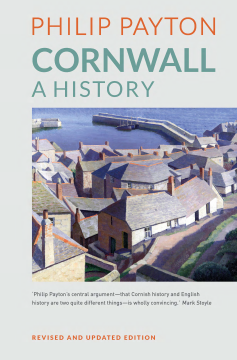
Additional Information
Book Details
Abstract
A new edition of Philip Payton’s modern classic Cornwall: A History, published now by University of Exeter Press, telling the story of Cornwall from earliest times to the present day.
Drawing upon a wide range of original and secondary sources, it begins with Cornwall’s geology and prehistory, moving through Celtic times to the creation of the kingdom of Kernow and its relationship with neighbouring England. The political accommodation of medieval Cornwall by the expanding English state through the twin institutions of the Duchy and Stannaries is examined, as is the flowering in the middle ages of literature in the Cornish language. Resistance to English intrusion – in the rebellions of 1497 and 1549 and in the Civil War – is explored.So too is Cornwall’s role in the subsequent expansion of Britain’s global influence, and Cornwall as an early centre of the industrial revolution is also discussed.
Mining and Methodism became twin strands of an assertive transnational identity which emigrant Cornish transplanted across the globe in the nineteenth-century. Thereafter, as the book shows, a vigorous Celtic revivalist movement championed the rebirth of the Cornish language and Cornwall’s status as a Celtic nation. At the same time, tourism, with its emphasis on Cornish distinctiveness, moved in the twentieth century to fill the gap left by the decline of mining.
The book concludes by examining the nature of twenty-first century Cornwall, contrasting an apparent heightening of Cornish consciousness with the increasing threats to Cornwall’s environment and identity.
Payton brilliantly brings together myth, fact, people, places, events…gripping.
Philip Payton is the leader of a new generation of historians exploring Cornwall's ambivalent position within the English state, and questioning the view of Cornwall as 'just another English county'. In this book he argues the case for the Cornish as a separate Celtic people, fully deserving a history of their own, and amply succeeds in his stated aim of bringing that history to the widest possible audience.
Awesomely researched… the essential book for anyone who loves the county.
from reviews of the 1996 edition:
Will rank among the classic books on Cornwall, if not the finest ever published.
[. . .] a new edition of Cornwall: A History is very welcome indeed. It is a key text for anyone working on the history of the Celtic nations, peoples and languages and a very valuable addition to the literature on modern British history.
One of the most comprehensive studies (by one of the most learned scholars) of Cornwall and the nature of Cornish identity ever undertaken.
Philip Payton is Emeritus Professor in the University of Exeter and Professor of History at Flinders University in Adelaide, Australia, and is the former Director of the Institute of Cornish Studies in the University of Exeter. He edited Cornish Studies, published annually from 1993-2013, the only series of publications that seeks to investigate and understand the complex nature of Cornish identity, as well as to discuss its implications for society and governance in contemporary Cornwall.
He has written extensively on Cornish topics, and recent books include A.L. Rowse and Cornwall: A Paradoxical Patriot (2005), Making Moonta: The Invention of Australia’s Little Cornwall (2007), John Betjeman and Cornwall: ‘The Celebrated Cornish Nationalist’ (2010), and (edited with Alston Kennerley and Helen Doe), The Maritime History of Cornwall (2014). He has recently been awarded South Australian Historian of the Year 2017 by the History Council of South Australia.
Table of Contents
| Section Title | Page | Action | Price |
|---|---|---|---|
| Cover | Cover | ||
| Title | iii | ||
| Copyright | iv | ||
| Contents | v | ||
| Map of Cornwall and the Isles of Scilly | vii | ||
| Preface | ix | ||
| Chapter One: Ancient stones | 1 | ||
| Chapter Two: Ancient peoples | 19 | ||
| Chapter Three: The mystery of the Celts | 37 | ||
| Chapter Four: From Dumnonia to Cornubia | 52 | ||
| Chapter Five: Anglia et Cornubia | 75 | ||
| Chapter Six: ‘We Utterly Refuse . . . This New English’ | 110 | ||
| Chapter Seven: ‘There is Much Danger in a Cornish Hugg’ | 144 | ||
| Chapter Eight: ‘The Large Continent of Cornwall’ | 177 | ||
| Chapter Nine: ‘So Many Brilliant Ornaments’ | 198 | ||
| Chapter Ten: ‘If You Haven’t Been to Moonta’ | 227 | ||
| Chapter Eleven: Re-Inventing Kernow | 259 | ||
| Chapter Twelve: Whither Cornwall? | 294 | ||
| Select Bibliography | 334 | ||
| Notes and References | 338 | ||
| Index | 366 |
